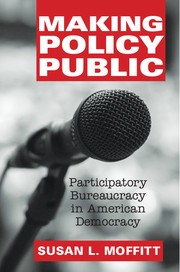Book contents
- Frontmatter
- Dedication
- Contents
- List of Figures
- List of Tables
- Preface
- Abbreviations
- 1 Portals of Democracy in American Bureaucracy
- 2 Participatory Bureaucracy in Practice
- 3 The Development of Public Committees
- 4 Making Educational Performance Public
- 5 Private Knowledge for Public Problems
- 6 Setting the Public Agenda
- 7 Deliberate Participation
- 8 The Impact of Public Advice
- 9 Participatory Bureaucracy in American Democracy
- Appendix
- Bibliography
- Index
- References
5 - Private Knowledge for Public Problems
Regulating Pharmaceutical Information
Published online by Cambridge University Press: 05 October 2014
- Frontmatter
- Dedication
- Contents
- List of Figures
- List of Tables
- Preface
- Abbreviations
- 1 Portals of Democracy in American Bureaucracy
- 2 Participatory Bureaucracy in Practice
- 3 The Development of Public Committees
- 4 Making Educational Performance Public
- 5 Private Knowledge for Public Problems
- 6 Setting the Public Agenda
- 7 Deliberate Participation
- 8 The Impact of Public Advice
- 9 Participatory Bureaucracy in American Democracy
- Appendix
- Bibliography
- Index
- References
Summary
Almost every package insert submitted to the FDA for approval is initially burdened with fiction, ranging from vague soft-sell language to outright false claims.... Nothing is more frustratingly prolonged and tortured than controversy over labeling.
J. Richard Crout, 1974[F]orces were operating to keep those of us who want openness ... to not have our say.
Testimony of Dr. Julia Apter to Senate Hearings, Member of the Cardiovascular and Renal Drugs Advisory Committee, 1974In the era before the passage of the Federal Advisory Committee Act, public participation in the FDA took a range of forms including: the 1955 Citizens’ Advisory Committee on the Food and Drug Administration; the Medical Advisory Panel on the Accidental Ingestion of Salicylate Preparations that was staffed through a contract with the National Academy of Sciences; informal engagement with professional societies such as the American Academy of Pediatrics; and industry committees that consulted with the American Drug Manufacturers Association and American Pharmaceutical Manufacturers Association. Each of these venues offered a vivid juxtaposition of agency-initiated public participation and relatively closed participatory processes, which ultimately earned the FDA the label of having one of the worst advisory committee transparency records among all government agencies. Participatory bureaucracy for educational assessments faced the challenge of producing “bureaucracy” given long-standing American antipathy toward federal government involvement in public education. Participatory bureaucracy in pharmaceutical regulation faced the challenge of mobilizing participation in ways conducive to democratic accountability: allegations of industry dominance or scientific exclusivity have confronted FDA participatory processes for over half a century.
The passage of the Federal Advisory Committee Act appeared peripheral to the participatory processes for educational assessments. For the FDA, FACA procedures brought more openness than had existed before. Before FACA, the FDA established a range of venues for gathering information from conventionally defined experts. Consistent with expectations for bureaucratic administration, the agency sought this form of advice – for low information/high independence tasks – privately. “Public” access came from the particular information exchanges, between the parties in the room. The FDA also experienced periodic participatory oversight: reviews and reports of the agency delivered to external audiences. When HEW requested these reviews, the reports largely promoted the agency instead of offering accounts that impugned the agency’s expertise.
- Type
- Chapter
- Information
- Making Policy PublicParticipatory Bureaucracy in American Democracy, pp. 112 - 127Publisher: Cambridge University PressPrint publication year: 2014



